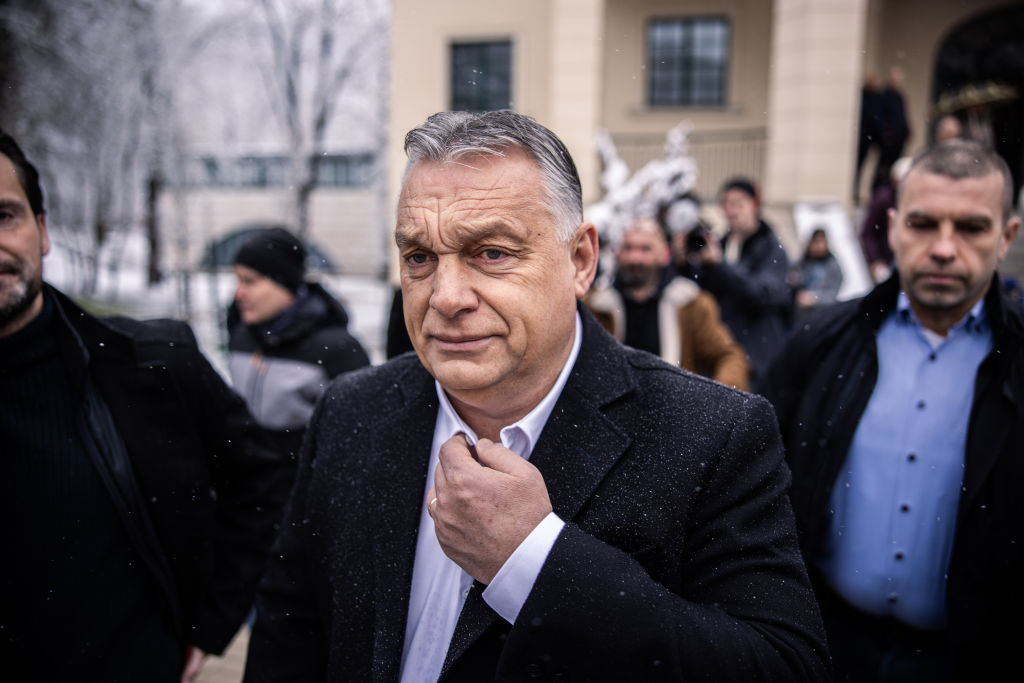Polls close in Hungary as opposition alliance seeks to unseat Orbán


A free daily email with the biggest news stories of the day – and the best features from TheWeek.com
You are now subscribed
Your newsletter sign-up was successful
Hungarian voters cast their ballots on Sunday to determine whether controversial leader Viktor Orbán will serve a fourth consecutive term as prime minister, Reuters reports.
Gergely Gulyás, a minister in Orbán's government, said the high turnout is a victory for democracy and that the early projections he's seen "give cause for optimism," per Euronews.
Orbán has refused to cut his country off from Russian oil and gas and will not allow weapons being sent to Ukrainian forces to be shipped through Hungary. He did, however, condemn Russian President Vladimir Putin's invasion of Ukraine. "I am standing on the basis of the Hungarian national interests. I am pro-Hungary," Orbán told reporters
The Week
Escape your echo chamber. Get the facts behind the news, plus analysis from multiple perspectives.

Sign up for The Week's Free Newsletters
From our morning news briefing to a weekly Good News Newsletter, get the best of The Week delivered directly to your inbox.
From our morning news briefing to a weekly Good News Newsletter, get the best of The Week delivered directly to your inbox.
The nationalist and socially conservative policies Orbán has pursued during his 12 years in office — including his emphasis on border security, his pro-natalist policies, his bans on things such as gender studies programs and the promotion of homosexuality and transgenderism to children, and his rhetoric about preserving Hungary's Christian heritage — have made him a popular figure with much of the American right, especially Fox News host Tucker Carlson, who visited Hungary and interviewed Orbán last year.
While campaigning in 2020, President Biden numbered Hungary among the world's "totalitarian regimes" and lumped Orbán in with the "thugs" who lead them.
Conservative Rod Dreher, who has spent time in Hungary, dismissed these labels. "[W]hen I left here late last summer, almost everyone I knew in Fidesz was really anxious about the 2022 election," Dreher wrote for The American Conservative on Friday. "In a true autocracy, leaders don't worry about elections."
A free daily email with the biggest news stories of the day – and the best features from TheWeek.com
Grayson Quay was the weekend editor at TheWeek.com. His writing has also been published in National Review, the Pittsburgh Post-Gazette, Modern Age, The American Conservative, The Spectator World, and other outlets. Grayson earned his M.A. from Georgetown University in 2019.
-
 Political cartoons for February 16
Political cartoons for February 16Cartoons Monday’s political cartoons include President's Day, a valentine from the Epstein files, and more
-
 Regent Hong Kong: a tranquil haven with a prime waterfront spot
Regent Hong Kong: a tranquil haven with a prime waterfront spotThe Week Recommends The trendy hotel recently underwent an extensive two-year revamp
-
 The problem with diagnosing profound autism
The problem with diagnosing profound autismThe Explainer Experts are reconsidering the idea of autism as a spectrum, which could impact diagnoses and policy making for the condition
-
 Judge blocks Hegseth from punishing Kelly over video
Judge blocks Hegseth from punishing Kelly over videoSpeed Read Defense Secretary Pete Hegseth pushed for the senator to be demoted over a video in which he reminds military officials they should refuse illegal orders
-
 Trump’s EPA kills legal basis for federal climate policy
Trump’s EPA kills legal basis for federal climate policySpeed Read The government’s authority to regulate several planet-warming pollutants has been repealed
-
 House votes to end Trump’s Canada tariffs
House votes to end Trump’s Canada tariffsSpeed Read Six Republicans joined with Democrats to repeal the president’s tariffs
-
 Bondi, Democrats clash over Epstein in hearing
Bondi, Democrats clash over Epstein in hearingSpeed Read Attorney General Pam Bondi ignored survivors of convicted sex offender Jeffrey Epstein and demanded that Democrats apologize to Trump
-
 El Paso airspace closure tied to FAA-Pentagon standoff
El Paso airspace closure tied to FAA-Pentagon standoffSpeed Read The closure in the Texas border city stemmed from disagreements between the Federal Aviation Administration and Pentagon officials over drone-related tests
-
 Judge blocks Trump suit for Michigan voter rolls
Judge blocks Trump suit for Michigan voter rollsSpeed Read A Trump-appointed federal judge rejected the administration’s demand for voters’ personal data
-
 US to send 200 troops to Nigeria to train army
US to send 200 troops to Nigeria to train armySpeed Read Trump has accused the West African government of failing to protect Christians from terrorist attacks
-
 Grand jury rejects charging 6 Democrats for ‘orders’ video
Grand jury rejects charging 6 Democrats for ‘orders’ videoSpeed Read The jury refused to indict Democratic lawmakers for a video in which they urged military members to resist illegal orders
